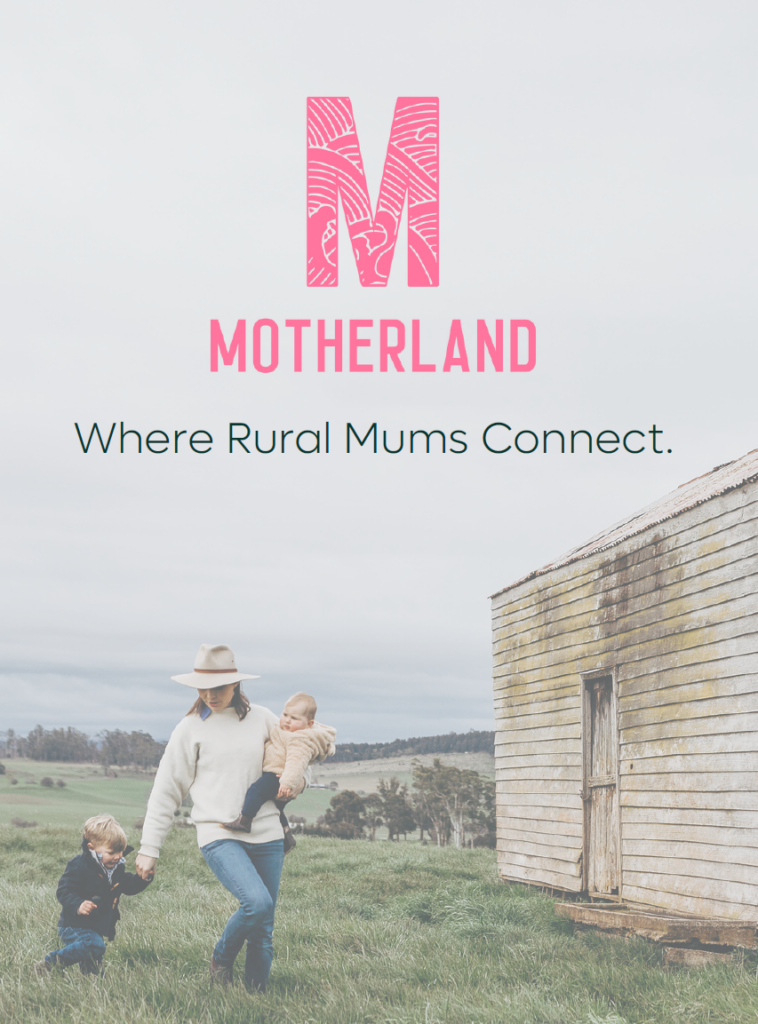Foundation for Rural & Regional Renewal (FRRR)
Founded by Stephanie Trethewey, the 2022 AgriFutures National Rural Woman of the Year, Motherland Australia’s mission is to eliminate the crippling social isolation many rural mums face by connecting them to a supportive online community and offering a mothers group program that every rural mum can access, regardless of her location.

At the core of Motherland’s initiatives is the Motherland Village program, an innovative online mothers’ group program designed to transcend geographical barriers. The program, which runs for six weeks, provides a personalised virtual space for rural mothers, creating connections and support networks that endure well beyond the program’s duration.
The impact of the Motherland Village program is evident, with 87% of participants reporting significant positive changes in their lives. The program has not only addressed the issue of social isolation but has also become a catalyst for rural mothers to do things differently and communicate regularly within their groups.
Complementing the virtual community is the Motherland podcast, launched in December 2019. With 27,000+ monthly listens and over 210 rural mothers interviewed, the podcast has become a powerful platform, consistently ranking in the Top 15 parenting podcasts on Apple iTunes nationally. It serves as a voice for rural mothers, addressing their unique experiences, challenges, and triumphs.
Over the past six months, Motherland has utilised an FRRR Fundraising account to fund a crucial Partnerships and Sales role. This strategic move has enabled the organisation to capitalise on the demand from the rural motherhood community, leading to a 50% increase in the online community and a 25% increase in projected partnership revenue for FY23/24.
“Our NFP account has been a gamechanger in helping us secure the funds required for this role- which has been pivotal to our charity’s growth and impact across rural Australia.”
The role has not only secured additional podcast advertising revenue and corporate partnerships but has also been instrumental in attracting sponsorship funds for Motherland’s national conference. The newfound revenue will also allow for improvements to the Motherland Village program for 2024, including the creation of video content featuring health and wellbeing professionals, which is currently underway.
Motherland is in the early stages of developing a formal fundraising strategy, with plans to be more public with their fundraising efforts and FRRR fundraising account throughout 2024. The organisation is focused on continued growth, with ongoing efforts to expand its impact through the Motherland Connect platform—an online resource hub for rural mothers that will launch later in the year.
You can support Motherland through the FRRR fundraising account, contributing to the reduction of social isolation, improvement of mental health outcomes, and the creation of meaningful connections across rural communities.
In our fourth and final podcast in this series, journalist Cameron Wilson discovers that a shared interest in conservation and environment can be a potent driver of social cohesion. We discover how botanical art has been an unlikely catalyst for an environmental project in outback Queensland and discuss the reasons why these projects break down isolation.
Speaking with botanical artist Jenny Mace and FRRR and AEGN Board member Anne Grindrod, we learn the value of people getting involved in projects that take into consideration the wider environment, and how this can be something that relieves the pressure of land owners during tough times.

